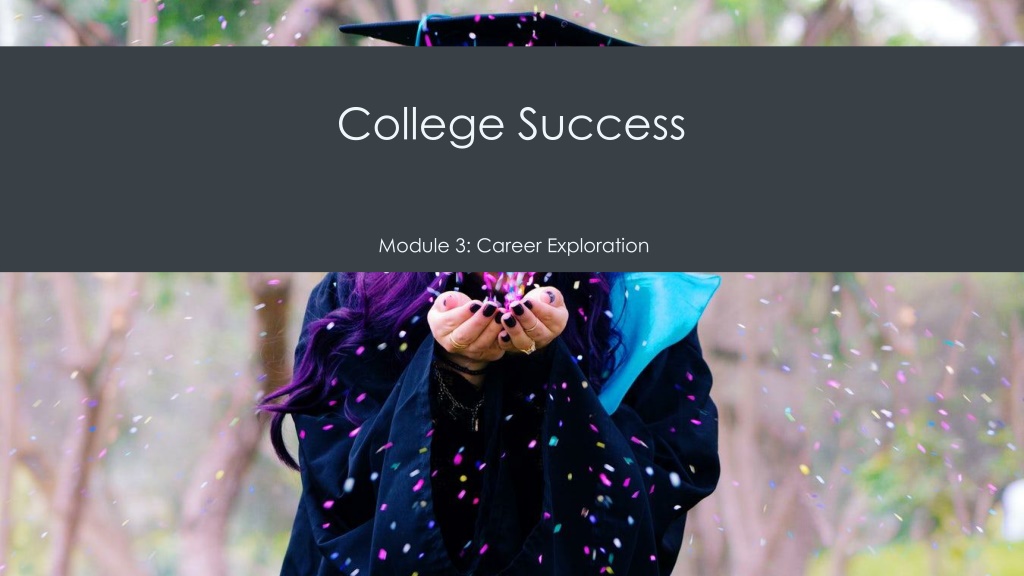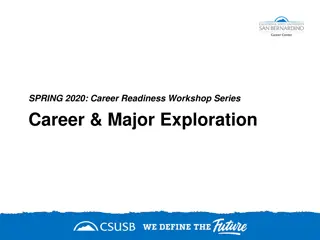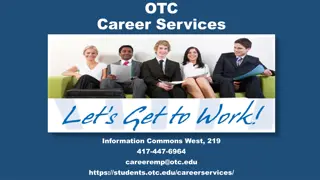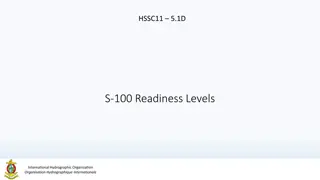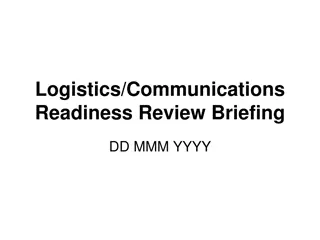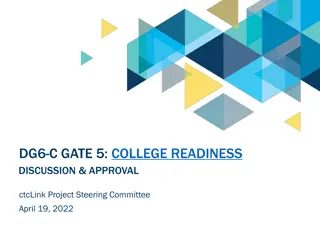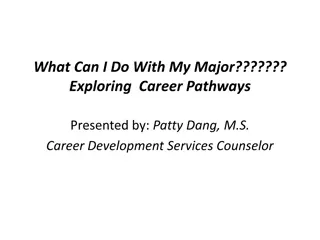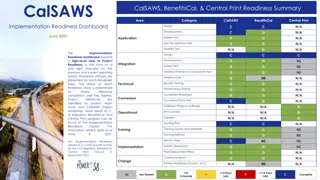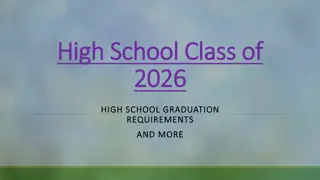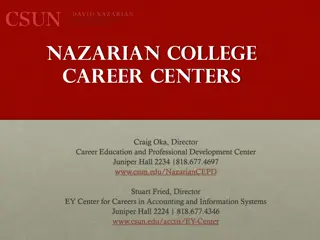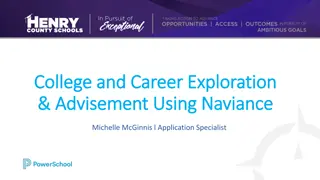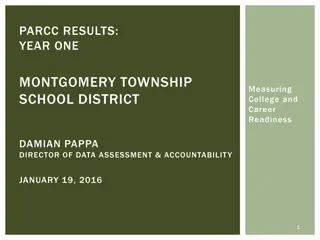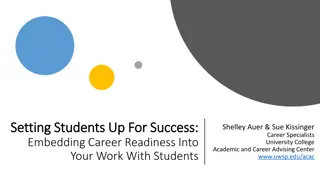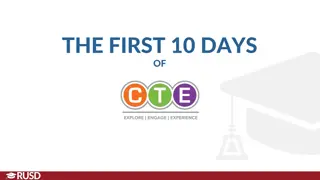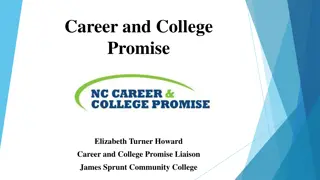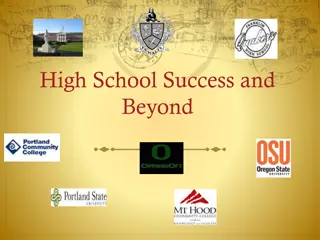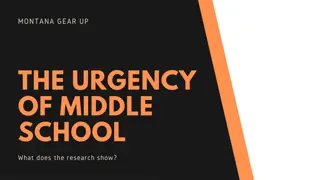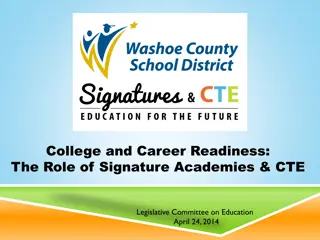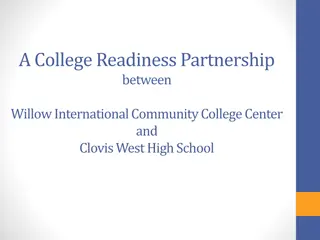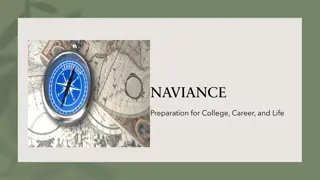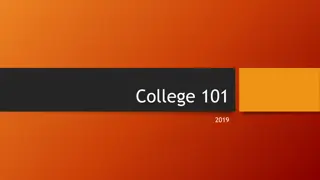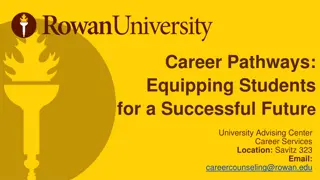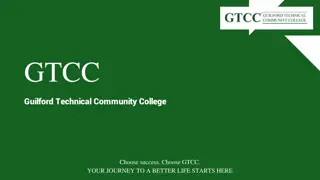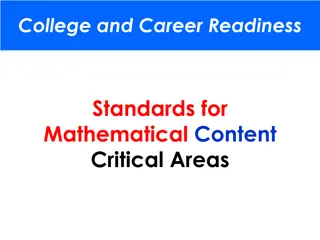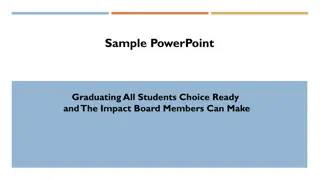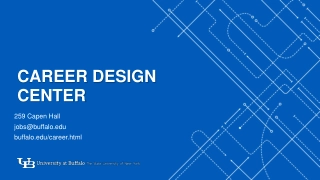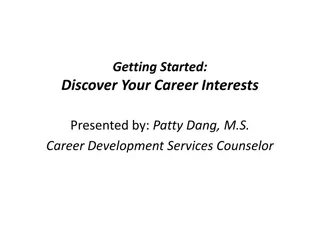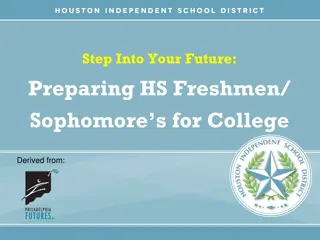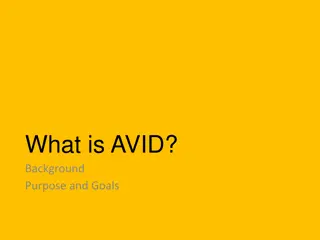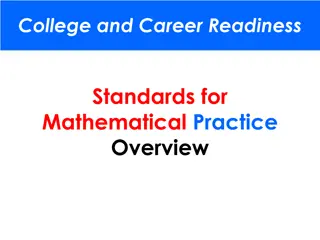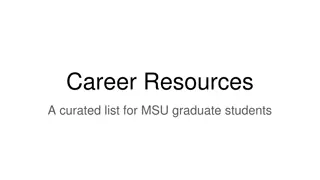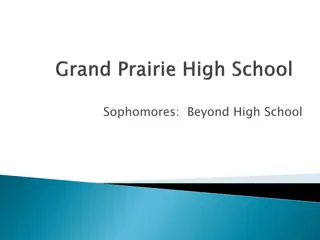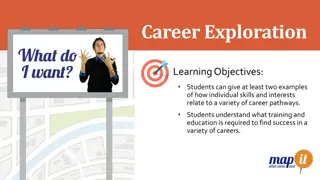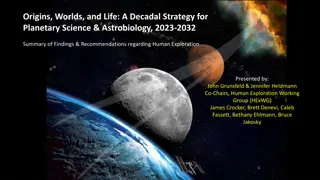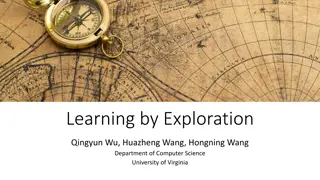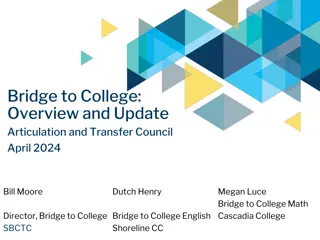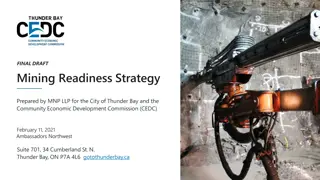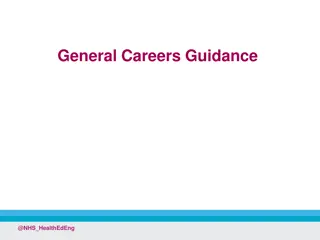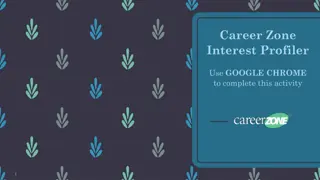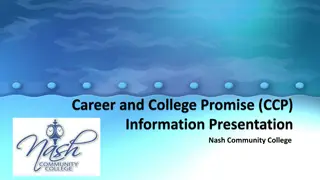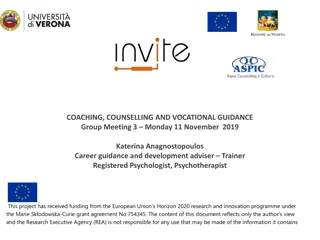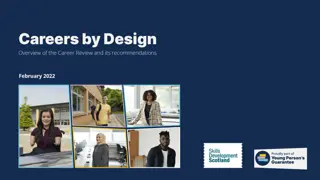Career Exploration and College Readiness Overview
Explore the key elements of career exploration and college readiness, including identifying motivations for attending college, evaluating the value of education, and understanding the differences between jobs and careers. Discover insights on becoming college and career ready, the value of a college education, and steps to choosing the right career path. Dive into learning outcomes, student perspectives, and the significance of developing skills essential for success in both education and the workplace.
Download Presentation

Please find below an Image/Link to download the presentation.
The content on the website is provided AS IS for your information and personal use only. It may not be sold, licensed, or shared on other websites without obtaining consent from the author. Download presentation by click this link. If you encounter any issues during the download, it is possible that the publisher has removed the file from their server.
E N D
Presentation Transcript
College Success Module 3: Career Exploration
Learning Outcomes: Career Paths 3.1.1 Identify your motivations for attending college and consider what it means to be college and career ready 3.1.2 Examine the value, both financial and otherwise, of a college education
Am I College and Career Ready? In general, you are a college and career-ready student if you have gained the necessary knowledge, skills, and professional behaviors to achieve at least one of the following: Earn a certificate or degree Participate in career training Enter the workplace Student Voices: What Does it Mean to be College and Career Ready? To capture student voices on what high expectations, college and career readiness, and their future mean to them, Achieve interviewed a number of high school students and recent high school graduates. Feel free to use this video in your own communications and advocacy efforts. (July 2012) https://www.achieve.org/student-voices
The Value of College In a 2011 Pew Research Center Survey, Americans were split on their perceptions of the main purpose of a college education: 47% said the purpose is to teach work- related skills 39% said it is to help a student grow personally and intellectually 12 % said it should be dedicated to both pursuits Employers place the greatest value on skills and knowledge that cut across all majors.
Jobs vs Careers A job lets you enjoy at least a minimal level of financial security, and it requires you to show up and do what is required of you. In exchange you get paid. A career, on the other hand, is more of a means of achieving personal fulfillment through the jobs you hold. In a career, your jobs tend to follow a sequence that leads to increasing master, professional development, and personal financial satisfaction.
Choosing a Career Five steps to help you choose the right career path: 1. Get to know yourself 2. Get to know your field 3. Prioritize your deal makers and rule out your deal breakers 4. Make a preliminary career decision and make a plan of action 5. Go out and achieve your career goals
Class Discussion What is the difference between a job and a career? Do you plan to use college to pursue one or the other?
Learning Outcomes: College Majors 3.3.1 List key strategies for selecting a college major 3.3.2 Identify the relationship between college majors and career paths (both why they matter and why they don't) 3.3.3 Identify sources for learning more about specific majors and related careers
Class Activity: Selecting a Major This activity helps you reflect on your major. Write a sentence or two to reflect on the following questions: Why did you select your major? If you are still deciding, what do you think you might declare as your major? Does your major matter to your career? What happens if you change your major? Does changing your major mean you change your career?
From Major to Career Get good academic and career advice Select a major that reflects your interests Marc Luber, a student, shares his insights on selecting a major andcareer in this video. Choosing a College Major Finding the Right Career Fit http://careersoutthere.com/finding-the-right-career-fit-choosing-a-college-major/ How to choose a college major and find the right career fit for you are both explained here through the host Careers Out There, Marc Luber, sharing his personal story. Career Tests to help find YOUR fit: http://careersoutthere.com/career-tests/ Video Guide to help you get the career YOU WANT: http://ow.ly/haB97 Want to learn the best networking informational interviewing tips? Get our video guide: http://ow.ly/haB97 Our Facebook: http://www.facebook.com/CareersOutThere
Sources for Choosing a Major and Career College catalog Faculty Academic Advisors Fellow students Students who have graduated Family Social communities Career Centers
Learning Outcomes: Professional Skills Building 3.4.1 List specific skills that will be necessary for your career path 3.4.2 List transferable skills that will be valuable for any career path 3.4.3 Explain how to acquire necessary skills, both in and out of class, for your career goals
Skills for a Career Hard skills versus Soft skills Soft skills are in higher demand (It is easier to teach an employee soft skills than hard skills) An employer might rather hire an inexperienced worker who can pay close attention to detail than an experienced worker who might cause problems on a work team.
Transferable Skills Skills are considered transferable if they are positive attributes that are invaluable in practically any kind of work. They do not require much training from employers. Many soft skills are transferable skills. Target lists what they think are the Top 10 Most Important Skills for an employee to have: 10 top skills that will get you a job when you graduate Find out the 10 top skills you need to get a job when you graduate - Watch our video and have a read of our article to find out more http://ow.ly/xiouP - Created by Roxanne Chand
Acquiring Necessary Skills Learn how to write clearly Learn how to speak Be reachable Learn about computers Build relationships in the community Attend conferences and events Find a project and get involved Collaborate with people Keep your online presence up to date Keep learning
Practice Question One 10 top skills that will get you a job when you graduate In this video, Target lists what they think are the Top 10 Most Important Skills for an employee to have: Find out the 10 top skills you need to get a job when you graduate - Watch our video and have a read of our article to find out more http://ow.ly/xiouP - Created by Roxanne Chand Take notes on the top ten. After you have a list, add your own idea. Did they miss anything in this video? If so, what?
Learning Outcomes: Career Development 3.5.1 Describe the stages of career development, and identify the stage you're currently in 3.5.2 Identify career development resources in your school, community, and beyond
Stages of Career Development 1. Growing: Ages 4-13 when you start to have a sense about your future. 2. Exploring: You find out your specific skills and aptitudes, and may try out a few different jobs. 3. Establishing: Entering a field you consider suitable, and are exploring stable job opportunities. 4. Maintaining: Coasting and cruising 5. Reinventing: Likely transitioning to retirement and pursuing new interests.
Career Development Resources Career Development Resources on Campus Books on Career Development The Secret to Getting a Job After College: Marketing Tactics to Turn Degrees into Dollars by Larry Chiagouris Career Roadmap Plan-Do-Check-Act (PDCA) what are your goals and objectives? sell yourself look at your results so far how should you act going forward? Internet Sites for Career Planning
Learning Outcomes: Networking 3.6.1 Define network and identify strategies for networking 3.6.2 Identify sources for developing professional networks
Strategies for Networking Networking is the process by which people build relationships with one another for the purpose of helping one another achieve professional goals. How do I get started with networking?
Professional Networks What are the best networking strategies at college? What are the best networking strategies at work? What are the best networking strategies at home and beyond?
Learning Outcomes: Resumes and Cover Letters 3.7.1 Define the purpose and contents of a r sum 3.7.2 Identify characteristics of an effective r sum 3.7.3 Identify characteristics of an effective cover letter
Purpose of Resumes and Cover Letters Your resume is a marketing, selling, and promotion tool. Elements of a Successful Resume: 1. Reverse chronological resume 2. Functional resume 3. Hybrid resume 4. Video, infographic, and website resume Picking a format for your resume that is clear and will stand out from the others is very important.
Writing Effective Resumes Watch a this resume tutorial for writing an effective resume: Components to Include: 1. Your contact information 2. A summary of your skills 3. Work experience 4. Volunteer experience 5. Education and training 6. References statement Resume Tutorial Resume formatting Tutorial created by the Workforce Development Council Snohomish County in partnership with WorkSource Snohomish County and Everett Community College. Paid for by Air Washington.
Writing Effective Cover Letters A cover letter is a letter of introduction, usually 3-4 paragraphs in length, that you attach to your resume It s a way of introducing yourself to a potential employer and explaining why you are suited for a position. Characteristics of an effective cover letter
Learning Outcomes: Interviewing 3.8.1 Describe effective strategies to prepare for an interview 3.8.2 Differentiate between different types of interview situations and identify appropriate interview techniques for each 3.8.3 Analyze different question types common in interviews
Preparing For a Job Interview Review the job description Research the company or organization Practice answering common questions Plan to dress appropriately Come prepared Be confident
Interview Types and Techniques How would you define the following interviews? Screening Interviews Phone or web conference interviews One-on-one interviews Panel interviews Serial interviews Lunch interviews Group interviews
Practice Question Two Job Interview Guide - 10 Different Types of Interviews in Today's Modern World http://www.interviewmastermind.com/freecourse?source=yt If you are jobless and can't figure out how to write a resume no matter how hard you try, here is the secret that's helped over 20,000 job seekers! Watch your FREE VIDEO right now at This video covers some pretty typical interview situations. Find a partner and share your experience with job interviews. Have you faced a similar or different scenario than what is listed in this video?
Class Activity: Interview Questions A common interview question is: Why should we hire you? Take a minute and write a paragraph to answer this question.
Quick Review The 5 steps of Choosing a Career The 5 Steps of Selecting Your Major Differences between hard skills, soft skills, and transferable skills The 5 Stages of Career Development The 4 Elements of a Successful Resume The 6 Steps of Writing Effective Resumes Interview Types and Techniques
